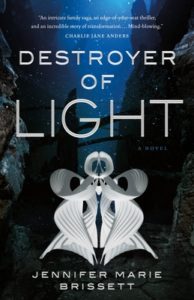
The beginning of the year is always a scramble to reshuffle the TBR after seeing a cavalcade of “Best of the Year” lists. And one of those books that showed up quite a few times was Jennifer Marie Brissett’s Destroyer of Light. Brissett is an author that’s been on my radar for a while, so I thought I’d give it a try.
While Destroyer of Light is billed as a retelling of the Hades and Persephone myth, it takes place in a much different setting—on a planet where humanity fled after being nearly wiped out by an alien race that exists outside of time as we know it—and as someone not especially familiar with the source material, I did not have any great difficulty following the plot. The story takes place after the extraterrestrial human refuge has been discovered by alien enemies, who on this occasion has decided to attempt living in peace with humanity. An odd relationship with time is a running theme, and the book takes place over multiple timelines, following several characters with unusual gifts: a girl being forced into service as a child solider, the mistress of that army’s leader, and two brothers searching for a missing child.
If the near genocide and child soldiers weren’t enough of an indication, be warned that this is a story that does not shy away from darkness. There’s slavery, death, and sexual violence. None of it is gratuitous, as the author is telling a story of survivors in unthinkable circumstances, but that doesn’t mean it can’t be a lot to read. That said, I would point to the handling of heavy themes as the book’s chief strength. Brissett expertly communicates the trauma of the survivors, and she leans into the messiness of a world with genocidal aliens on one hand and revolutionaries leading an army of enslaved children on the other. There is no easy resolution, no unambiguous victory. Everything gained comes at great cost, and we feel that cost with the characters.
Unfortunately, I found the novel a little too intricate for its own good. Despite the different timelines, it’s not terribly difficult to piece together the main plot or the relationship between the different characters in different times. But as I read, I found myself getting tangled in the minutiae. For instance, there are inconsistencies in causality, but were they continuity errors or meant to be somehow explicable in terms of characters experiencing nonlinear time? If it’s the latter, I didn’t see how it really fit together, and if it’s the former, I should forget about it and move on, but either way, it made it difficult for me to fully focus on the overarching story.
Similarly, I found the pacing made it a struggle to connect to the characters. Ultimately, I found the major characters to be well-drawn and sympathetic, but they tended to flit in and out of the narrative. Because the book spends so much time in truly brutal situations, the characters don’t exactly open up in a page or two. And that’s all well and good, but by the time I found myself really growing attached, we’d hit a perspective switch that left the character on the sidelines for extended periods. I know this is a common struggle in multi-POV epics—which I generally like—but it’s hard for such a story to succeed without generating durable attachments that can survive several chapters away from a perspective character, and Destroyer of Light fell short on that score.
On the whole, the thematic work makes Destroyer of Light worth a look, but I was let down by the structure. Brissett has clear writing chops, and she has a very good story to tell, but some of the intricate details and timing of the perspective switches made it hard for me to fully immerse.
Recommended if you like: examination of heavy themes.
Can I use it for Bingo? It’s hard mode for Weird Ecology, Mental Health, and Revolutions and Rebellions. It also fits Family Matters, BIPOC Author, and Wibbly Wobbly Timey Wimey (and may be hard, depending on whether you interpret being outside of time as a variety of time travel).
Overall rating: 13 of Tar Vol’s 20. Three stars on Goodreads.
